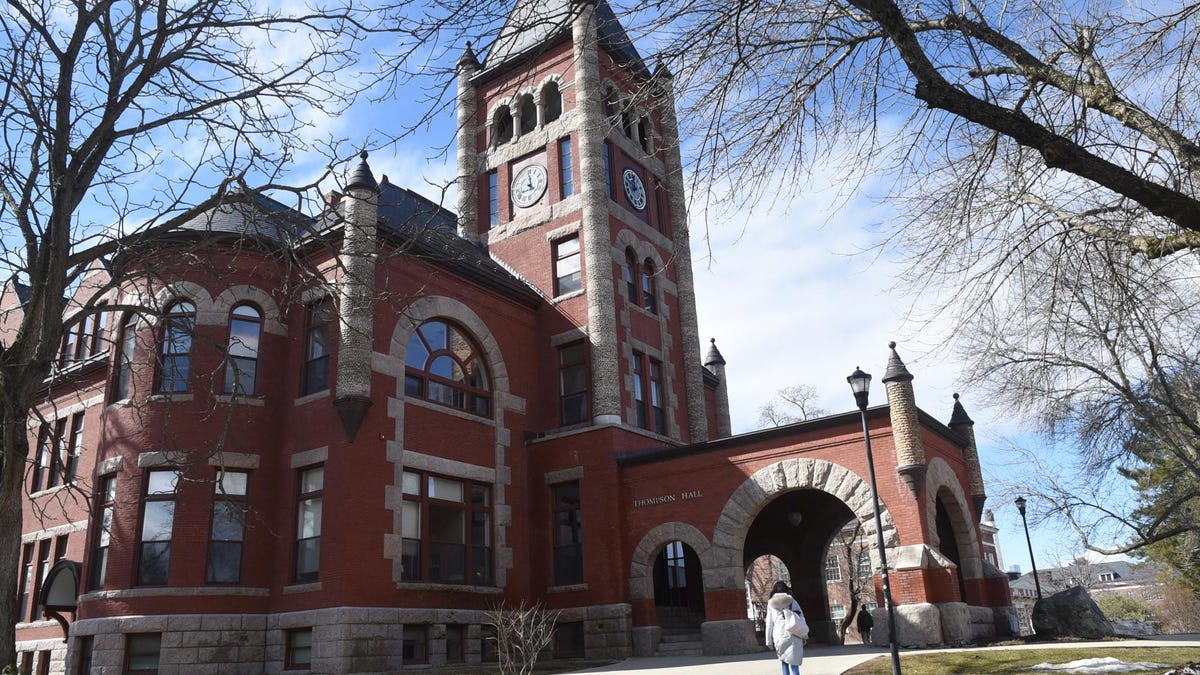DURHAM — The University of New Hampshire is planning another $17.5 million in spending cuts on the heels of May layoffs that eliminated three dozen school employee positions.
Elizabeth Chilton, the university’s president, announced the upcoming cuts in a June 30 message.
“The gap between our revenues and expenses has continued to grow, including by $8.2 million associated with lower than anticipated fall enrollments and significant projected changes in federal funding,” Chilton wrote. “Additionally, the state budget that passed last week reduces the University System budget by $8 million in FY2026, and another $10 million in FY2027, which is a total of 15% across the biennium.
3% across the board reduction
The upcoming $17.5 million reduction will be accomplished in part through a $12.1 million cut that will result from a 3% across-the-board reduction in spending. Every university academic and administrative unit has been tasked by Chilton to identify further cuts this summer.
“While I have said repeatedly that we should try to avoid across-the-board cuts whenever possible, this was the best option available given the urgency of our current fiscal challenges,” Chilton said of the 3% reduction. “University leadership is thinking carefully about strategic changes that align with university priorities and their respective units, and we will continue to maintain investment in strategic areas, including enrollment, student success, and research excellence.”
Hiring delayed at least 120 days
Chilton advised an additional $3.6 million will be saved through hiring practices, noting a minimum 120-day delay is being implemented for all new hiring requests and position refills.
“We will manage an additional $1.8 million reduction centrally with a focus on operational efficiency, expense management, and administrative services,” she added.
The president called for more cost-cutting suggestions from college deans and university leaders.
In a change of protocol, Chilton said each New Hampshire public university – UNH’s campuses, Plymouth State University and Keene State College – will report directly to Chancellor Catherine Provencher for the next two years, rather than to the system’s board of trustees.
“We will continue to look for strategic sources of revenue, but there will also need to be significant cost savings. Some of these savings will come from a deeper focus on shared services across the system,” Chilton said.
Last month, in a $12.5 million college-wide reduction, 35 unidentified UNH staffers were cut, though the move did not include any faculty members or classroom instructors, per spokesperson Tania deLuzuriaga.
Tuition going up for first time in six years
Chilton’s announcement Monday comes after New Hampshire Gov. Kelly Ayotte approved a $15.9 billion biennial budget on Friday to fund the state over the next two years.
“These are extraordinary times in higher education,” her Monday message states. “As a sector, we have enormous challenges, including demographic declines, reduced state appropriations, and federal funding impacts. Moreover, the value of higher education and fundamental research is being questioned and devalued. Thus, our strategic plan could not come at a more important time in UNH’s history. As we ask ourselves, ‘Where do we want UNH to be in 2030?’, it is critically important to recognize that in five years, we are almost certainly going to be a smaller university than we are now. This is a time to decide what our strengths are and how we can invest in those areas in the next chapter of our history. This will take cross-unit coordination, creativity, and a willingness to work together for the sake of our students, UNH, and our state. A focus on core and aspirational strengths will fuel our strategic plan and our next capital campaign, as we expand the sources of funding to fuel our continued excellence.”
USNH spokesperson Lisa Thorne reported previously the system received $95 million in state aid annually in the past two fiscal years.
Tuition increases across the public university system are planned for the 2025-2026 academic year, marking the first time in-state student costs have increased in six years.
In-state UNH students must pay $15,908 per year starting in the fall semester, exclusive of room and board costs, up from $15,520 annually the past six years. Annual out-of-state student tuition is expected to cost $37,070, a jump from $36,170 required last school year.
The University of New Hampshire reported having over 12,500 undergraduate students enrolled in the spring semester across its Durham and Manchester campuses and online course program, down from as high as 13,499 students in the spring of 2018.
